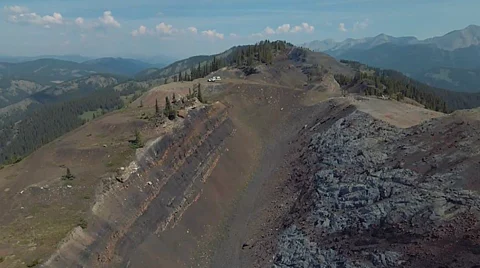

More than 40 years have passed since coal was dominant in Crowsnest Pass, AB, but a referendum vote on Monday could influence a controversial debate about reviving it.
Monday the Municipality of Crowsnest Pass, which has about 6,000 residents, will be asking them to say yes or no to a direct question — “Do you support the development and operations of the metallurgical coal mine at Grassy Mountain?”
Advance voting kicked off days earlier. Although the result will be non-binding and not have any sway on regulatory or legal issues, it would be another factor in the ongoing, contentious debate about economy versus environment.
Crowsnest Pass Mayor Blair Painter said he backed the proposal.
“The fact is we have been on a direction of supporting this project,” said Painter to The Canadian Press.
“We don’t have an industry.”
Painter said Crowsnest Pass needs an industry. This is because its tax base is more than 80% residential.
“We’d like to ease that off our residents and this would give us the opportunity to be able to do that,” he said.
Australian mining company Northback said it wants to develop the Grassy Mountain Coal Project at a site that was mined more than 60 years ago but did not have proper restoration work done to it. Throughout the duration of the project, Northback said the site would be reclaimed.
To justify bringing in the coal mine, Northback said metallurgical coal, which is used to create steel, is required in any economy. However, opponents have expressed concerns about the impact this mining could have on downstream drinking water and the larger ecosystem.
At the moment, the issue remains before the Alberta Energy Regulator and court challenges against it have happened.
Project opponent David McIntyre and his wife Monica Field worked as managers at the Frank Slide Interpretive Centre and have opposed plans to develop the area.
McIntyre lives about 10 kilometres downwind of the proposed mine and said he is worried about the noise and carcinogenic particles that would stem from it.
While McIntyre and Field are opposed to the mine, he said they were informed they live outside the municipal boundary, making them unable to vote in the referendum. Moreover, he noted there are hundreds of other people who moved in after coal was dominant in the area who are on the outside looking in.
“It appears very obvious that the community of Crowsnest Pass, to try and get this vote, are working very hard to ensure that the people they have voting, the old-school miners and families who are hoping for coal, turn the tide,” he said to The Canadian Press.
If the mine goes ahead, he said it will not mean long-term prosperity for the area.
“If it’s a go, it won’t be the future of the Pass,” he said.
“It will be the short-term future of the Pass, but won’t impact its long-term worth.”
For one century, King Coal dominated in the Crowsnest Pass. It is located near the provincial boundary with British Columbia and became the largest coal centre in Alberta, generating more coal than other mining areas in the province.
Out of the 10 original coal mining communities that sprang up on the Alberta side of Crowsnest Pass, five of them remain — Blairmore, Frank, Bellevue, Coleman and Hillcrest.
The last mine shut down in 1983 because cheaper, safer open-pit mines began operating on the BC side.
Although the Alberta mines have stopped operating, the government has revised its policy to open up new areas of the province that had been barred from open-pit mining since 1976.
Canadian country singer Corb Lund, who has spoken out against coal mining in the Eastern Slopes, held a benefit concert one week ago with proceeds going towards advocacy group Crowsnest Headwaters.
Since McIntyre’s views have been unpopular, he said he was a little nervous attending the concert. He added he and Field had an axe driven through a vehicle windshield and tires slashed.
“I can’t attribute it to anything other than the fact we have spoken out on issues, water-related issues and mine-related issues,” he said.
“It’s a huge issue on both sides — and volatile, I would say.”
The Municipality of Crowsnest Pass said in September a question will be put to residents about digging coal, which will determine whether or not Northback should be allowed to launch the Grassy Mountain Coal Project near Blairmore.
Crowsnest Pass municipal councillors unanimously passed a motion authorizing a non-binding plebiscite on the matter, which would be put to a vote on Monday.
The Municipality of Crowsnest Pass said the question that will be on the ballot is “Do you support the development and operations of the metallurgical coal mine at Grassy Mountain.”
The Western Standard released a documentary called Coal, Culture, and Conflict about coal mining in Crowsnest Pass on October 30, covering the historic communities holding rich stories and a profound connection to their environment.
Many residents shared with the Western Standard film team their deep-rooted connection to coal mining — a generational legacy for their families.
The last mine in Crowsnest Pass closed in 1983, but these locations once served as the community’s lifeblood. Evidence of their importance remains in the historic structures that have fallen into disrepair over the years.
